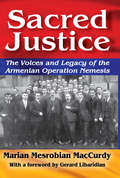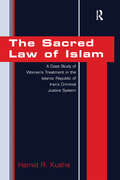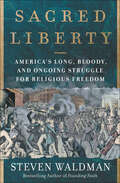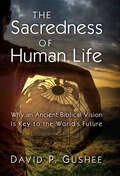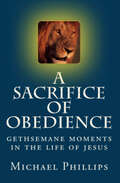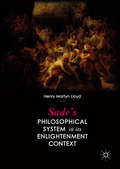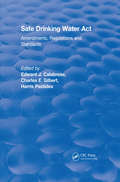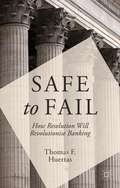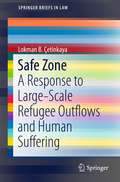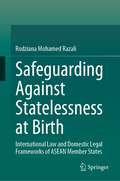- Table View
- List View
Sachkunde im Bewachungsgewerbe (IHK): Lehrbuch für Prüfung und Praxis
by Robert SchwarzDieses Lehrbuch behandelt systematisch alle Fachgebiete der IHK-Sachkundeprüfung nach dem aktuellen Rahmenstoffplan. Besonderen Wert hat der Autor dabei auf den oft als schwierig empfundenen Rechtsteil gelegt: Zahlreiche Abbildungen und Beispiele veranschaulichen die Gesetzestexte und ihre Bedeutung für die Praxis, erleichtern das Stoffverständnis und das Lernen. Übersichtlich und verständlich erläutert das Buch die Grundprinzipien der Rechtsordnung der Bundesrepublik Deutschland und deren Anwendung, wichtige Fachbegriffe und die Stellung der privaten Sicherheit. So bietet das Werk die optimale Prüfungsvorbereitung - Schritt für Schritt. Die korrigierte und aktualisierte 4. Auflage wurde dem aktuellen Rahmenstoffplan im Frühjahr 2020 angepasst, insbesondere bezüglich der Verordnung über das Bewachungsgewerbe (BewachV).
Sachkunde im Bewachungsgewerbe (IHK): Lehrbuch für Prüfung und Praxis
by Robert SchwarzDieses Lehrbuch behandelt systematisch alle Fachgebiete der IHK-Sachkundeprüfung nach dem aktuellen Rahmenstoffplan. Besonderen Wert hat der Autor dabei auf den oft als schwierig empfundenen Rechtsteil gelegt: Zahlreiche Abbildungen und Beispiele veranschaulichen die Gesetzestexte und ihre Bedeutung für die Praxis, erleichtern das Stoffverständnis und das Lernen. Übersichtlich und verständlich erläutert das Buch die Grundprinzipien der Rechtsordnung der Bundesrepublik Deutschland und deren Anwendung, wichtige Fachbegriffe und die Stellung der privaten Sicherheit. So bietet das Werk die optimale Prüfungsvorbereitung – Schritt für Schritt. Die gründlich durchgesehene und verbesserte 5. Auflage entspricht dem aktuellen Rahmenstoffplan 2020/2021 und berücksichtigt auch die Verordnung über das Bewachungsgewerbe (BewachV).
Sachkunde im Bewachungsgewerbe (IHK): Lehrbuch für Prüfung und Praxis
by Robert SchwarzDieses Lehrbuch behandelt systematisch alle Fachgebiete der IHK-Sachkundeprüfung nach dem aktuellen Rahmenstoffplan. Besonderen Wert hat der Autor dabei auf den oft als schwierig empfundenen Rechtsteil gelegt: Zahlreiche Abbildungen und Beispiele veranschaulichen die Gesetzestexte und ihre Bedeutung für die Praxis, erleichtern das Stoffverständnis und das Lernen. Übersichtlich und verständlich erläutert das Buch die Grundprinzipien der Rechtsordnung der Bundesrepublik Deutschland und deren Anwendung, wichtige Fachbegriffe und die Stellung der privaten Sicherheit. So bietet das Werk die optimale Prüfungsvorbereitung – Schritt für Schritt. Die überarbdeitete 6. Auflage entspricht dem aktuellen Rahmenstoffplan der DIHK vom Mai 2021.
Sachkunde im Bewachungsgewerbe (IHK) - Übungsbuch
by Robert SchwarzDieses Übungsbuch ergänzt das gleichnamige Lehrbuch. Es schließt die Lücke zwischen dem Unterrichts- und Lernstoff und der Vorbereitung auf die Prüfung. Mit Hilfe der Fragen und Antworten können Lernende den wichtigen Prüfungsstoff strukturiert wiederholen, den eigenen Lernfortschritt kontrollieren und sich gründlich auf die Prüfung vorbereiten. Zehn Übungsfälle mit ausführlichen Lösungen stellen Zusammenhänge her und vertiefen das Gelernte.
Sachkunde im Bewachungsgewerbe (IHK) - Übungsbuch: 250 Fragen mit Antworten und 10 Übungsfälle mit Lösungen
by Robert SchwarzDieses Übungsbuch ergänzt das gleichnamige Lehrbuch. Es schließt die Lücke zwischen dem Unterrichts- und Lernstoff und der Vorbereitung auf die Prüfung. Mit Hilfe der Fragen und Antworten können Lernende den wichtigen Prüfungsstoff strukturiert wiederholen, den eigenen Lernfortschritt kontrollieren und sich gründlich auf die Prüfung vorbereiten. Zehn Übungsfälle mit ausführlichen Lösungen stellen Zusammenhänge her und vertiefen das Gelernte. Die aktualisierte 3. Auflage wurde gründlich durchgesehen.
Sachkunde im Bewachungsgewerbe (IHK) - Übungsbuch: 250 Fragen mit Antworten und 10 Übungsfälle mit Lösungen
by Robert SchwarzDieses Übungsbuch ergänzt das gleichnamige Lehrbuch. Es schließt die Lücke zwischen dem Unterrichts- und Lernstoff und der Vorbereitung auf die Prüfung. Mit Hilfe der Fragen und Antworten können Lernende den wichtigen Prüfungsstoff strukturiert wiederholen, den eigenen Lernfortschritt kontrollieren und sich gründlich auf die Prüfung vorbereiten. Zehn Übungsfälle mit ausführlichen Lösungen stellen Zusammenhänge her und vertiefen das Gelernte. Die aktuelle 4. Auflage wurde sorgfältig durchgesehen.
Sachkunde im Bewachungsgewerbe (IHK) - Übungsbuch: 250 Fragen mit Antworten und 10 Übungsfälle mit Lösungen
by Robert SchwarzDieses Übungsbuch ergänzt das gleichnamige Lehrbuch. Es schließt die Lücke zwischen dem Unterrichts- und Lernstoff und der Vorbereitung auf die Prüfung. Mit Hilfe der Fragen und Antworten können Lernende den wichtigen Prüfungsstoff strukturiert wiederholen, den eigenen Lernfortschritt kontrollieren und sich gründlich auf die Prüfung vorbereiten. Zehn Übungsfälle mit ausführlichen Lösungen stellen Zusammenhänge her und vertiefen das Gelernte. Die überarbeitete 5. Auflage entspricht dem aktuellen Rahmenstoffplan vom Mai 2021.
Sacred Justice: The Voices and Legacy of the Armenian Operation Nemesis (Armenian Studies)
by Marian Mesrobian MacCurdySacred Justice is a cross-genre book that uses narrative, memoir, unpublished letters, and other primary and secondary sources to tell the story of a group of Armenian men who organized Operation Nemesis, a covert operation created to assassinate the Turkish architects of the Armenian Genocide. The leaders of Operation Nemesis took it upon themselves to seek justice for their murdered families, friends, and compatriots. Sacred Justice includes a large collection of previously unpublished letters, found in the upstairs study of the author's grandfather, Aaron Sachaklian, one of the leaders of Nemesis, that show the strategies, personalities, plans, and dedication of Soghomon Tehlirian, who killed Talaat Pasha, a genocide leader; Shahan Natalie, the agent on the ground in Europe; Armen Garo, the center of Operation Nemesis; Aaron Sachaklian, the logistics and finance officer; and others involved with Nemesis. Marian Mesrobian MacCurdy tells a story that has been either hidden by the necessity of silence or ignored in spite of victims' narratives—the story of those who attempted to seek justice for the victims of genocide and the effect this effort had on them and on their families. Ultimately, this volume reveals how the narratives of resistance and trauma can play out in the next generation and how this resistance can promote resilience.
The Sacred Law of Islam: A Case Study of Women's Treatment in the Islamic Republic of Iran's Criminal Justice System
by Hamid R. KushaIslam’s Sacred Law is one of the most complex, detailed and comprehensive legal theories that Islam, as a Western religion, has produced in its capacity as a doctrine of social justice. However, few available texts have dealt with the treatment of women under the actual system of justice that adheres to Islam’s Sacred Law. This book fills this void by providing a much needed comprehensive study of the application of the Sacred Law to women under the Islamic Republic of Iran’s justice system. It will be a fascinating guide to all those interested in comparative law, criminal justice and the sociology of law.
Sacred Liberty: America's Long, Bloody, and Ongoing Struggle for Religious Freedom
by Steven Waldman“[A] compelling study of the most essential breakthrough of modernity: the right to believe, or not, as one wishes. A great book about a monumental issue.” —Jon Meacham, Pulitzer Prize–winning authorSacred Liberty offers a dramatic, sweeping survey of how America built a unique model of religious freedom, perhaps the nation’s “greatest invention.” Steven Waldman, the bestselling author of Founding Faith, shows how early ideas about religious liberty were tested and refined amidst the brutal persecution of Catholics, Baptists, Mormons, Quakers, African slaves, Native Americans, Muslims, Jews and Jehovah’s Witnesses. American leaders drove religious freedom forward—figures like James Madison, George Washington, the World War II presidents (Roosevelt, Truman, and Eisenhower) and even George W. Bush. But the biggest heroes were the regular Americans—people like Mary Dyer, Marie Barnett and W. D. Mohammed—who risked their lives or reputations by demanding to practice their faiths freely. Just as the documentary Eyes on the Prize captured the rich drama of the civil rights movement, Sacred Liberty brings to life the remarkable story of how America became one of the few nations in world history that has religious freedom, diversity and high levels of piety at the same time. Finally, Sacred Liberty provides a roadmap for how, in the face of modern threats to religious freedom, this great achievement can be preserved.“This is an important and fascinating book full of riveting stories, provocative insights, inspiring heroes, and some serious warnings. The American model of religious freedom should be the envy of the world. But if we don’t understand how we made this great ‘invention,’ we could easily squander the achievement.” —Reza Aslan, #1 New York Times–bestselling author of Zealot
Sacred Nature: Restoring our Ancient Bond with the Natural World
by Karen ArmstrongA profound exploration of the spiritual power of nature—and an urgent call to reclaim that power in everyday life.Since the beginning of time, humankind has looked upon nature and seen the divine. In the writings of the great thinkers across religions, the natural world inspires everything from fear to awe to tranquil contemplation; God, or however one defined the sublime, was present in everything. Yet today, even as we admire a tree or take in a striking landscape, we rarely see nature as sacred.In this deeply powerful book, the bestselling historian of religion Karen Armstrong re-sacralizes nature for modern times. Drawing on her vast knowledge of the world's religious traditions, she vividly describes nature's central place in spirituality across the centuries: from the Book of Job to St. Thomas Aquinas, from Lao Tzu to Wordsworth, and from the Stoics to Jainism and beyond. Throughout, she reveals how we have lost our sense of the divine, and how we can get it back.Armstrong explores the power of silence and solitude, the nature of personal sacrifice and the need to reconnect with sorrow and compassion—and how greater contact with and appreciation for nature can help us in unexpected ways. In bringing this age-old wisdom to life, Armstrong shows modern readers how to rediscover nature's potency and form a connection to something greater than ourselves.
The Sacredness of Human Life: Why an Ancient Biblical Vision Is Key to the World's Future
by David P. GusheeThis authoritative book is the most comprehensive examination ever of the sacredness of human life. Never before has one volume explored this subject in such a multifaceted way, encompassing biblical roots, theological elaborations, historical cases, and contemporary ethical perspectives. Tracing the concept of the sacredness of human life from Scripture through church history to the present day, David Gushee argues that viewing human life as sacred is one of the most precious legacies of biblical faith — albeit one that the church has too often failed to uphold. Besides providing a masterful historical survey, Gushee’s discussion covers the many current ethical challenges and perspectives that will impact the survival and flourishing of human life, including biotechnology, the death penalty, abortion, human rights, nuclear weapons, just war theory, women’s rights, and creation care.Gushee’s Sacredness of Human Life is a game-changing book that will set the standard for all future discussions of this key ethical concept.
Sacrifice: How the Deadliest Vaccine in History Targeted the Most Vulnerable
by James Thorp Celia FarberSacrifice documents the true story of Dr. James Thorp, a respected doctor of maternal fetal medicine, who in 2020, finds his entire profession has lost its mind, as well as its soul. Stunned to find his colleagues take the bribe money, drink the Kool-Aid, and push the COVID-19 shots, Thorp is one of the few Ob-Gyns to bear witness and broadcast the multitude of pregnancy complications including miscarriages, stillbirths, and many other tragic outcomes resulting from the shots. One of the few doctors from the maternal-fetal medicine realm who publicly protested the Covid shots as directly deadly to his patients—unborn babies—Thorp witnessed the carnage on a daily basis firsthand, documented it, published papers, and spoke up on countless media platforms, and in Senate hearings in Washington, DC. He was terminated, without any cause, and went on to campaign around the country to get the truth out. This is his story.
A Sacrifice of Obedience: Gethsemane Moments in the Life of Jesus
by Michael PhillipsThe Christian author and George MacDonald biographer shares an enlightening meditation on the need for sacrifice in contemporary Christianity.Michael Phillips began writing A Sacrifice of Obedience in 2002, more than a decade before it was published. As the world moved further into the twenty-first century, the message of his book took on a more profound urgency. Christians everywhere—including Phillips himself—seem resistant the imperatives of sacrifice and obedience. Yet they remain the bull’s eye of the Christian faith. Now, after revisiting and expanding on his original manuscript, Phillips shares his candid and perceptive thoughts on the difficult yet deeply rewarding life all Christians are called to live.
A Sad Fiasco: Colonial Concentration Camps in Southern Africa, 1900–1908 (War and Genocide #29)
by Jonas KreienbaumOnly in recent years has the history of European colonial concentration camps in Africa—in which thousands of prisoners died in appalling conditions—become widely known beyond a handful of specialists. Although they preceded the Third Reich by many decades, the camps’ newfound notoriety has led many to ask to what extent they anticipated the horrors of the Holocaust. Were they designed for mass killing, a misbegotten attempt at modernization, or something else entirely? A Sad Fiasco confronts this difficult question head-on, reconstructing the actions of colonial officials in both British South Africa and German South-West Africa as well as the experiences of internees to explore both the similarities and the divergences between the African camps and their Nazi-era successors.
Sade’s Philosophical System in its Enlightenment Context
by Henry Martyn LloydThis book connects the philosophy of the Marquis de Sade—one of the most notorious, iconic, and yet poorly-understood figures within the history of European thought—with the broader themes of the Enlightenment. Rather than seeing himself as a mere pornographer, Sade understood himself as continuing the progressive tradition of French Enlightenment philosophy. Sade aspired to be a philosophe. This book uses intellectual history and the history of philosophy to reconstruct Sade’s philosophical ‘system’ and its historical context. Within the period’s discourse of sensibility Sade draws on the philosophical and the literary to form a relatively sophisticated ‘system’ which he deploys to critically engage with the two major strands of eighteenth-century ethical theory: the moral sense and natural law traditions. This work is of interest to: ‘Continental’ Philosophy, Critical Theory, French Studies, the History of Eighteenth-Century Philosophy, Literary Studies, the History of Moral Philosophy, and Enlightenment Studies.
Safe Drinking Water Act (CRC Press Revivals)
by Edward J. CalabreseThis new book covers drinking water regulations such as disinfectant by-products, synthetic organics, inorganic chemicals, microbiological contaminants, volatile organic chemicals, radionuclides, fluoride, toxicological approaches to setting new national drinking water regulations, and trihalomethanes. In addition, organic and inorganic compounds scheduled to be regulated in 1989 and new candidates for the 1990s regulations are detailed.
Safe Performance in a World of Global Networks: Case Studies, Collaborative Practices and Governance Principles (SpringerBriefs in Applied Sciences and Technology)
by Jean-Christophe Le Coze Benoît JournéThis open access book provides an analytical and critical outlook, by leading scholars, of the impact of various trends in the quality of collaboration and resulting safety outcomes that arise from the evolution of traditional integrated production within a single firm into a complex web of partnerships and supply chains. In the face of increasing fragmentation within industrial production and the associated rise in the complexity of inter-organizational communication and transaction, this book analyses causal factors such as cost pressures, globalization of demand, increasingly flexible resource allocation and work organization, changes in legal liability and the possibilities afforded by information technology. Various case studies focus on the effects of crossing boundaries between organizations, between different trades and professions and between countries, assessing the effect of variations in regulatory structures and national cultures. Furthermore, they illustrate the wide range of organizational forms to be found in high-hazard industries today and the impact, potential or real, of the variety of forms of partnership on safety and well-being at work. The contributors assess the effect of out-sourcing and of various forms of partnership and governance on safety at work and how they can be made to support the prevention of major accident hazards.
Safe Spaces, Brave Spaces: Diversity and Free Expression in Education
by John PalfreyHow the essential democratic values of diversity and free expression can coexist on campus. Safe spaces, trigger warnings, microaggressions, the disinvitation of speakers, demands to rename campus landmarks—debate over these issues began in lecture halls and on college quads but ended up on op-ed pages in the New York Times and the Wall Street Journal, on cable news, and on social media. Some of these critiques had merit, but others took a series of cheap shots at “crybullies” who needed to be coddled and protected from the real world. Few questioned the assumption that colleges must choose between free expression and diversity. In Safe Spaces, Brave Spaces, John Palfrey argues that the essential democratic values of diversity and free expression can, and should, coexist on campus. Palfrey, currently Head of School at Phillips Academy, Andover, and formerly Professor and Vice Dean at Harvard Law School, writes that free expression and diversity are more compatible than opposed. Free expression can serve everyone—even if it has at times been dominated by white, male, Christian, heterosexual, able-bodied citizens. Diversity is about self-expression, learning from one another, and working together across differences; it can encompass academic freedom without condoning hate speech.Palfrey proposes an innovative way to support both diversity and free expression on campus: creating safe spaces and brave spaces. In safe spaces, students can explore ideas and express themselves with without feeling marginalized. In brave spaces—classrooms, lecture halls, public forums—the search for knowledge is paramount, even if some discussions may make certain students uncomfortable. The strength of our democracy, says Palfrey, depends on a commitment to upholding both diversity and free expression, especially when it is hardest to do so.
Safe To Fail
by Thomas F. HuertasBanks are entering a new environment. Regulation and supervision are becoming tougher, so that banks will be less likely to fail. If a bank does fail, bail-in rather than bail-out will be the new resolution regime, so that investors, not taxpayers, bear loss. Safe to Fail sums up the challenges that banks will face and how they can meet them.
Safe Zone: A Response to Large-Scale Refugee Outflows and Human Suffering (SpringerBriefs in Law)
by Lokman B. ÇetinkayaUsing legal arguments consistent with international law, this book explores whether and under which circumstances a State (or States) may establish and militarily enforce safe zones in countries that produce large-scale refugee outflows so as to protect its (or their) own interests by averting said outflows, as well as to alleviate human suffering in today’s world of civil and internal warfare.Though large-scale refugee outflows have become an increasingly frequent problem in inter-state relations, international law offers no clear remedy. Accordingly, interpretation and adaptation of the existing rules and principles of international law, in addition to State practice and the jurisprudence of international courts, are required in order to find appropriate and lawful responses to such situations. The book examines countermeasures, necessity and humanitarian intervention as possible legal grounds to justify the establishment of safe zones.Since the proposal of a safe zone for Syria remains on the international community’s agenda, the specific conditions of this case are particularly addressed in order to assess the suitability and legality of a possible safe zone in Syria.
Safeguarding Adults and the Law, Third Edition: An A-Z of Law and Practice
by Michael MandelstamSafeguarding Adults and the Law, now in its third edition, sets this complex area of work within an extensive legal framework and provides many useful pointers for practitioners and students. It is now in an A-Z format, enabling quick reference to a wide range of civil and criminal law, and to legal case law.The book covers safeguarding duties under the Care Act 2014 and in particular the making of enquiries by local authorities, safeguarding adults boards, Department of Health guidance, human rights, regulation of health and social care providers, barring of carers from working with vulnerable adults, criminal records certificates, mental capacity, the High Court's inherent jurisdiction, undue influence, assault, battery, wilful neglect, ill treatment, self-neglect, manslaughter, murder, theft, fraud, sexual offences, modern slavery, domestic violence legislation, data protection and the sharing of information.The book focuses on how these areas of law, each with its own set of rules, apply to the practice of safeguarding adults. It contains numerous legal case summaries to bring the law to life. Fully updated, it reflects significant changes to civil and criminal law over the last five years.A critical introduction analyses serious challenges and issues inherent in the current culture of health and social care, and the implications for adult safeguarding.This book will be an essential resource for all those working in social care, health care and the police, as well as the many other agencies involved in safeguarding.
Safeguarding Against Statelessness at Birth: International Law and Domestic Legal Frameworks of ASEAN Member States
by Rodziana Mohamed RazaliThis book covers the essential aspects of prevention of childhood statelessness focusing on norms governing the subject through the rights to acquire a nationality and to birth registration, two vital safeguards to prevent statelessness among children. Its unique feature lies in its exposition of the international legal norms focusing on prevention of childhood statelessness and systematic analyses of domestic legal frameworks on nationality and birth registration of the 10 ASEAN Member States. This book is designed for a wide range of readers comprising academics, advocates, students, policy makers, and other stakeholders working on statelessness affecting children, especially in Southeast Asia.
Safeguarding the Future: Security and Privacy by Design for AI, Metaverse, Blockchain, and Beyond (Security, Audit and Leadership Series)
by null Alan TangIn the ever-evolving landscape of technology, emerging innovations like artificial intelligence (AI), blockchain, quantum computing, brain–computer interfaces (BCIs), and the Metaverse are transforming industries at an unprecedented rate. However, with these advancements come significant challenges, particularly in the realms of security and privacy. Safeguarding the Future: Security and Privacy by Design for AI, Metaverse, Blockchain, and Beyond by Dr. Alan Tang offers a comprehensive guide to navigating these challenges, providing a holistic framework to secure and protect the privacy of these cutting-edge technologies.What sets this book apart is its unique blend of technical depth and practical application. Dr. Tang leverages his extensive experience in privacy and security to deliver actionable insights that are crucial for organizations looking to stay ahead in this rapidly changing digital era. From aligning business strategies with security and privacy goals to implementing unified frameworks across multiple technologies, this book is an essential resource for executives, security professionals, and anyone involved in the deployment of emerging technologies.Key Features: In-Depth Analysis: Detailed exploration of the security and privacy risks associated with AI, blockchain, quantum computing, BCI, and other emerging technologies Unified Frameworks: A comprehensive, step-by- step guide to creating and operationalizing a unified security and privacy framework adaptable to various technologies Regulatory Alignment: Insights into aligning security and privacy practices with global regulations such as GDPR, CCPA, and ISO standards Case Studies and Real-World Examples: Practical case studies and examples that illustrate how to apply the concepts discussed in real-world scenarios Ethical Considerations: Examination of ethical issues surrounding the deployment of these technologies, with recommendations for addressing them proactively Future-Proofing Strategies: Guidance on preparing for future advancements and ensuring long-term compliance and security Whether you are a chief technology officer, chief privacy officer, data protection officer, or a security professional, this book equips you with the knowledge and tools needed to protect your organization’s data and ensure the secure deployment of emerging technologies. By adopting the principles outlined in this book, you can not only harness the full potential of these innovations but also safeguard the privacy and security of your organization and its stakeholders.
Safeguarding Vulnerable Adults and the Law
by Michael MandelstamThe protection of vulnerable adults is a fast emerging area of work for local authorities, the NHS and other agencies. Safeguarding Vulnerable Adults and the Law, sets this within a comprehensive legal framework. The relevant law and guidance is extensive. It includes Department of Health guidance (No Secrets), human rights, the regulation of health and social care providers, the barring of carers from working with vulnerable adults, care standards tribunal cases, mental capacity, undue influence, assault, battery, wilful neglect, ill treatment, manslaughter, murder, theft, fraud, sexual offences, data protection and the sharing of information. The book focuses on how these areas of law apply to vulnerable adults, and brings together an extensive body of case law to illustrate this. Also covered is how local authorities and the NHS may themselves be implicated in the harm - through abuse, neglect or omission - suffered by vulnerable adults. For example, in terms of the gross lapses in standards of care, infection control, nutrition and basic dignity sometimes to be found in hospitals. All those working in community care, adult social work, health care and housing will find this book invaluable. Local authorities, the NHS, voluntary organisations and students will find this to be essential reading.







